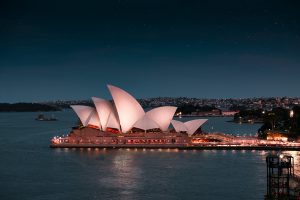“I come from a land down under, where beer does flow and men chunder,” were lyrics made world-famous some 40 years ago by the Australian rock group Men at Work. For non-Australians, the word “chunder” is Australian slang meaning “to vomit,” usually as a result of drinking too much beer. Another iconic song was in the 1970s used to advertise GMH cars “down under”: “We love football, meat pies, kangaroos, and Holden cars.”
Fortunately, Australia has progressed a lot since then into a modern First World nation, yet we continue to struggle with a large national insecurity complex and self-doubt – often masked by loud and aggressive behavior at home, on the cricket and football field, and whilst traveling abroad – as to who we are and what our exact place is in the Asian region.
This “uncomfortableness” was one display once again last month, in the usual division that attended the celebration of our national day. Australia Day is celebrated each January 26, and marks the day in 1788 when Captain Arthur Phillip guided a fleet of 11 British ships carrying convicts into the colony of New South Wales, effectively founding Australia and simultaneously marking the beginning of the dispossession of our First Nations people.
But this unease goes beyond the date of our national day, touching on questions about the suitability of our national anthem, which was this year subject to a poorly-timed and single word-change by our prime minister this year from “young” to “one”, and also our flag. These are core symbols that should provide a foundation for us all, and that also sends a clear message to our strategic and economically important neighbors and trading partners. Canadians and, closer to home, Indonesians showed maturity in creating their own flag as a symbol upon which they built a true national identity, and more defined and secure nations.
Australia’s population is now made-up of almost 30 per cent of citizens who were born overseas. Just over 12 percent have Asian heritage. Yet ironically, many people in Asia still see Australia as the “big empty white land” located south of Indonesia, and a country that is still the deputy sheriff to the United States in the region. These perceptions are incorrect and outdated, as Australia is mostly one of the most successful multicultural nations on Earth, that is also home to very smart, friendly and sophisticated people who can contribute significantly to the growth, stability, and prosperity of our region. It’s just we don’t act like it.
Our political leaders go to great lengths to remind us that Asia is our future, and that we must build closer links with our immediate region; Western Australia even has a state minister for Asian engagement. Yet deep in our psyche remains a lingering suspicion about Asians, and a deeper insecurity about who we are as a people and how exactly we fit in to this part of the world.
Research from the prestigious Lowy Institute shows that over 60 percent of Australians still lack trust for Indonesians for example, whilst simultaneously “loving” the Balinese. Meanwhile, we prefer to forget how anxious we were about the “swarms” of Vietnamese who were seeking a new life in Australia back in the 1970s – the same people who now grow near 25 per cent of all vegetables that end up on our dinner plates, whilst simultaneously creating a diverse culture, economy, and profitable export markets in Asia.
We have also talked as a nation about progressing the health and living standards of our own First Australians, to show respect for indigenous and African players who participate in our national game of football, and to stop our women from being subjected to domestic violence, yet very little progress has been made.
We need a national goal to become a more quietly confident, outwardly looking and secure nation, and it needs to start with the support of Aboriginal elders to integrate, or preferably adopt, the existing aboriginal flag – a stunning flag that is definitively “Australian” – as our national emblem. By establishing a new national day to celebrate our “independence” from the British monarchy, creating our own head-of-state, and adopting a song such as Bruce Woodley’s “I Am Australian,” which was penned in 1987, as a more relevant and inspirational national anthem, we could go a long way to not only completing the reconciliation process with our First Nations people, but also clearly articulating to the world who we are, what we stand for, and how we see our place in the Asian region. We just need the courage, vision, and the leadership to do it.
Ross B. Taylor AM is the president of the Perth-based Indonesia Institute Inc. The views expressed in the article are his own.

































